Media Essay: Analyzing Gender Representation in Media
VerifiedAdded on 2022/09/08
|6
|1693
|26
Essay
AI Summary
This essay analyzes the operation of power within society through the lens of discourse, particularly as it relates to media representation and its influence on gender identity and sexuality. Focusing on the movie 'She is the Man' (2006), the essay deconstructs the film's plot and representation using Foucauldian concepts of power and sexuality. The analysis explores how the film reinforces or challenges societal norms regarding gender roles and the heteronormative discourse. The essay also considers the implications of media representation for early childhood education, emphasizing the importance of understanding how children interpret messages about gender and identity. The essay argues that while the film attempts to address feminist themes, it ultimately reinforces patriarchal undercurrents, highlighting the need for critical analysis of media's impact on shaping perceptions and behaviors. The essay concludes by advocating for the use of discourse analysis in early childhood education to ensure children develop a healthy understanding of gender and sexuality.
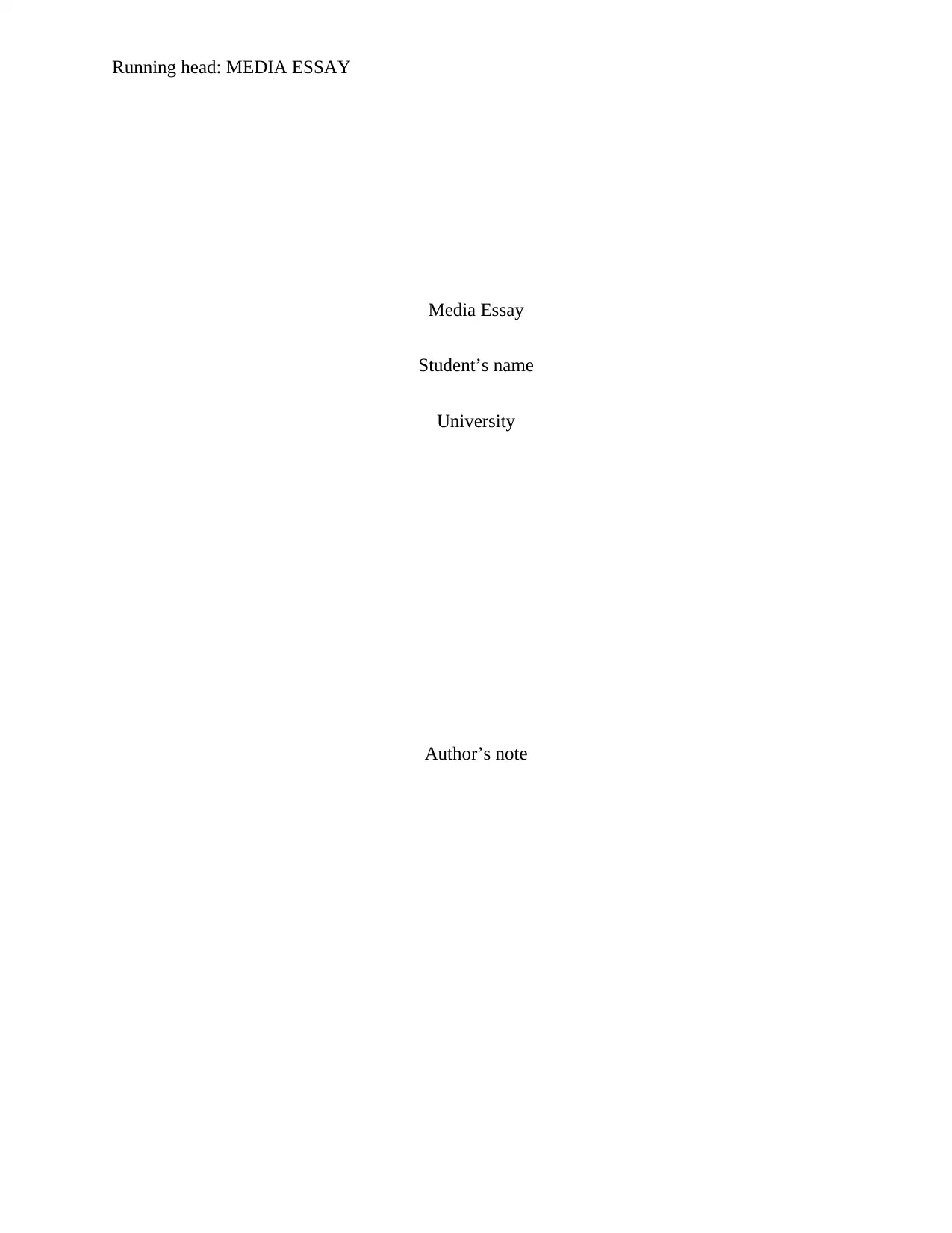
Running head: MEDIA ESSAY
Media Essay
Student’s name
University
Author’s note
Media Essay
Student’s name
University
Author’s note
Paraphrase This Document
Need a fresh take? Get an instant paraphrase of this document with our AI Paraphraser
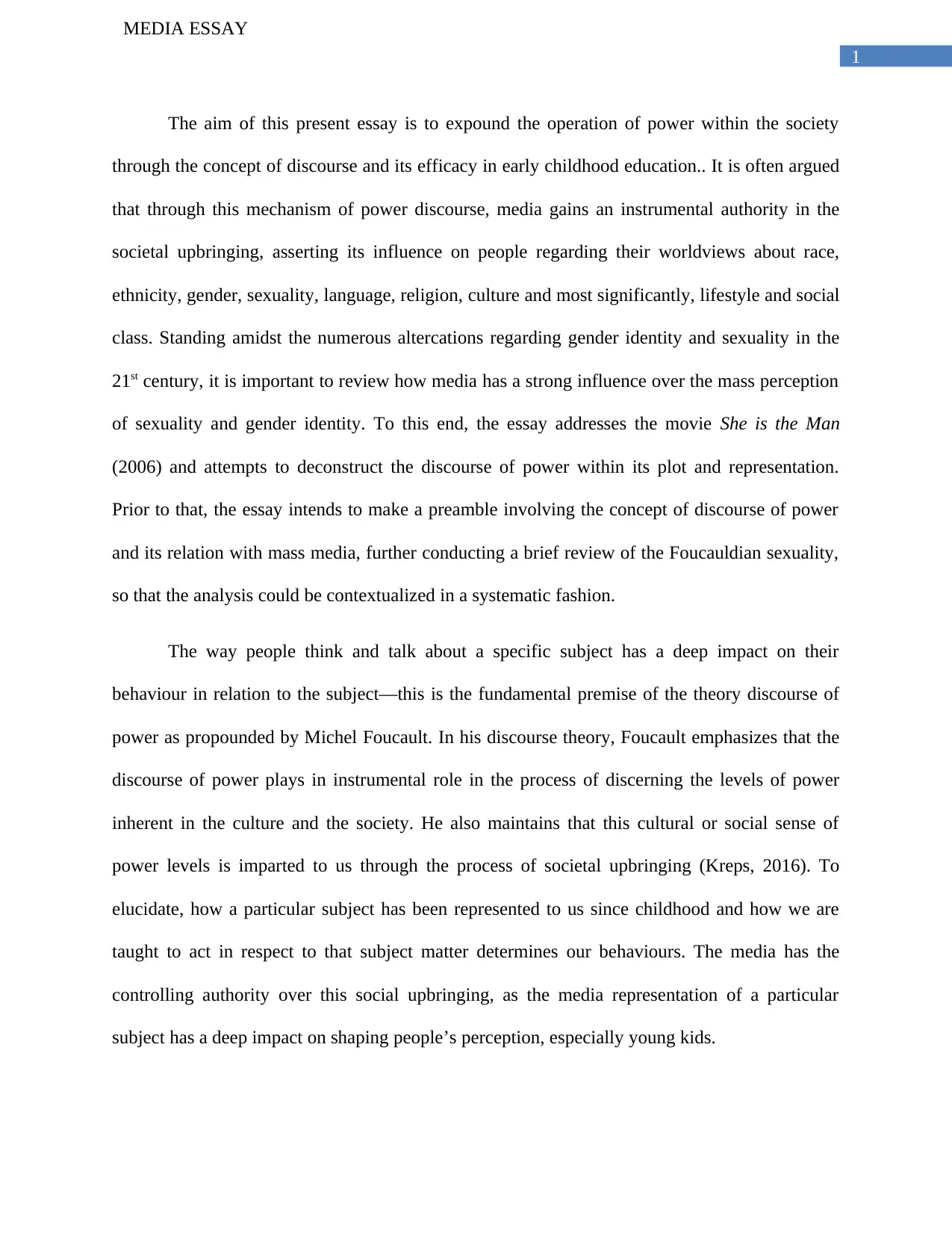
1
MEDIA ESSAY
The aim of this present essay is to expound the operation of power within the society
through the concept of discourse and its efficacy in early childhood education.. It is often argued
that through this mechanism of power discourse, media gains an instrumental authority in the
societal upbringing, asserting its influence on people regarding their worldviews about race,
ethnicity, gender, sexuality, language, religion, culture and most significantly, lifestyle and social
class. Standing amidst the numerous altercations regarding gender identity and sexuality in the
21st century, it is important to review how media has a strong influence over the mass perception
of sexuality and gender identity. To this end, the essay addresses the movie She is the Man
(2006) and attempts to deconstruct the discourse of power within its plot and representation.
Prior to that, the essay intends to make a preamble involving the concept of discourse of power
and its relation with mass media, further conducting a brief review of the Foucauldian sexuality,
so that the analysis could be contextualized in a systematic fashion.
The way people think and talk about a specific subject has a deep impact on their
behaviour in relation to the subject—this is the fundamental premise of the theory discourse of
power as propounded by Michel Foucault. In his discourse theory, Foucault emphasizes that the
discourse of power plays in instrumental role in the process of discerning the levels of power
inherent in the culture and the society. He also maintains that this cultural or social sense of
power levels is imparted to us through the process of societal upbringing (Kreps, 2016). To
elucidate, how a particular subject has been represented to us since childhood and how we are
taught to act in respect to that subject matter determines our behaviours. The media has the
controlling authority over this social upbringing, as the media representation of a particular
subject has a deep impact on shaping people’s perception, especially young kids.
MEDIA ESSAY
The aim of this present essay is to expound the operation of power within the society
through the concept of discourse and its efficacy in early childhood education.. It is often argued
that through this mechanism of power discourse, media gains an instrumental authority in the
societal upbringing, asserting its influence on people regarding their worldviews about race,
ethnicity, gender, sexuality, language, religion, culture and most significantly, lifestyle and social
class. Standing amidst the numerous altercations regarding gender identity and sexuality in the
21st century, it is important to review how media has a strong influence over the mass perception
of sexuality and gender identity. To this end, the essay addresses the movie She is the Man
(2006) and attempts to deconstruct the discourse of power within its plot and representation.
Prior to that, the essay intends to make a preamble involving the concept of discourse of power
and its relation with mass media, further conducting a brief review of the Foucauldian sexuality,
so that the analysis could be contextualized in a systematic fashion.
The way people think and talk about a specific subject has a deep impact on their
behaviour in relation to the subject—this is the fundamental premise of the theory discourse of
power as propounded by Michel Foucault. In his discourse theory, Foucault emphasizes that the
discourse of power plays in instrumental role in the process of discerning the levels of power
inherent in the culture and the society. He also maintains that this cultural or social sense of
power levels is imparted to us through the process of societal upbringing (Kreps, 2016). To
elucidate, how a particular subject has been represented to us since childhood and how we are
taught to act in respect to that subject matter determines our behaviours. The media has the
controlling authority over this social upbringing, as the media representation of a particular
subject has a deep impact on shaping people’s perception, especially young kids.
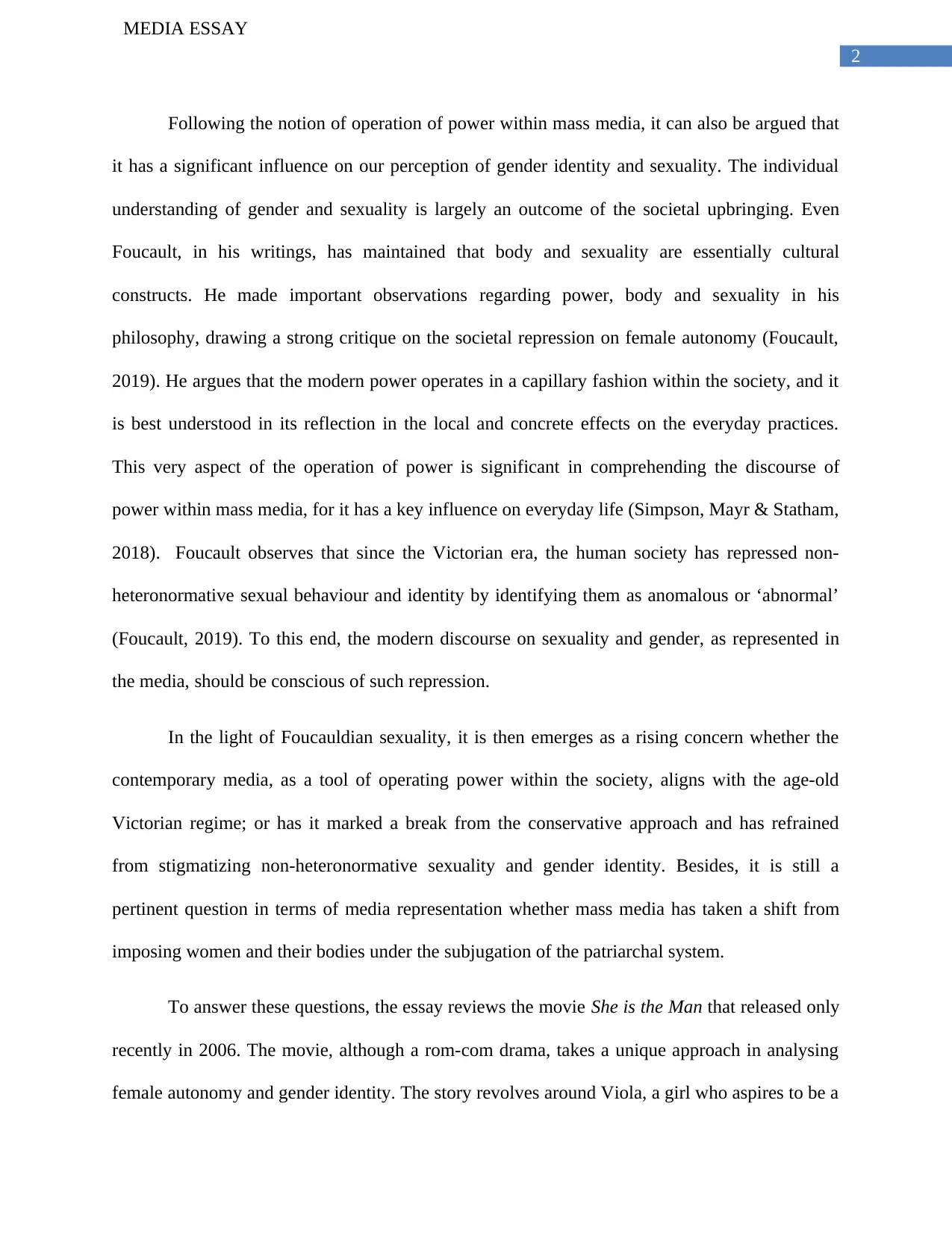
2
MEDIA ESSAY
Following the notion of operation of power within mass media, it can also be argued that
it has a significant influence on our perception of gender identity and sexuality. The individual
understanding of gender and sexuality is largely an outcome of the societal upbringing. Even
Foucault, in his writings, has maintained that body and sexuality are essentially cultural
constructs. He made important observations regarding power, body and sexuality in his
philosophy, drawing a strong critique on the societal repression on female autonomy (Foucault,
2019). He argues that the modern power operates in a capillary fashion within the society, and it
is best understood in its reflection in the local and concrete effects on the everyday practices.
This very aspect of the operation of power is significant in comprehending the discourse of
power within mass media, for it has a key influence on everyday life (Simpson, Mayr & Statham,
2018). Foucault observes that since the Victorian era, the human society has repressed non-
heteronormative sexual behaviour and identity by identifying them as anomalous or ‘abnormal’
(Foucault, 2019). To this end, the modern discourse on sexuality and gender, as represented in
the media, should be conscious of such repression.
In the light of Foucauldian sexuality, it is then emerges as a rising concern whether the
contemporary media, as a tool of operating power within the society, aligns with the age-old
Victorian regime; or has it marked a break from the conservative approach and has refrained
from stigmatizing non-heteronormative sexuality and gender identity. Besides, it is still a
pertinent question in terms of media representation whether mass media has taken a shift from
imposing women and their bodies under the subjugation of the patriarchal system.
To answer these questions, the essay reviews the movie She is the Man that released only
recently in 2006. The movie, although a rom-com drama, takes a unique approach in analysing
female autonomy and gender identity. The story revolves around Viola, a girl who aspires to be a
MEDIA ESSAY
Following the notion of operation of power within mass media, it can also be argued that
it has a significant influence on our perception of gender identity and sexuality. The individual
understanding of gender and sexuality is largely an outcome of the societal upbringing. Even
Foucault, in his writings, has maintained that body and sexuality are essentially cultural
constructs. He made important observations regarding power, body and sexuality in his
philosophy, drawing a strong critique on the societal repression on female autonomy (Foucault,
2019). He argues that the modern power operates in a capillary fashion within the society, and it
is best understood in its reflection in the local and concrete effects on the everyday practices.
This very aspect of the operation of power is significant in comprehending the discourse of
power within mass media, for it has a key influence on everyday life (Simpson, Mayr & Statham,
2018). Foucault observes that since the Victorian era, the human society has repressed non-
heteronormative sexual behaviour and identity by identifying them as anomalous or ‘abnormal’
(Foucault, 2019). To this end, the modern discourse on sexuality and gender, as represented in
the media, should be conscious of such repression.
In the light of Foucauldian sexuality, it is then emerges as a rising concern whether the
contemporary media, as a tool of operating power within the society, aligns with the age-old
Victorian regime; or has it marked a break from the conservative approach and has refrained
from stigmatizing non-heteronormative sexuality and gender identity. Besides, it is still a
pertinent question in terms of media representation whether mass media has taken a shift from
imposing women and their bodies under the subjugation of the patriarchal system.
To answer these questions, the essay reviews the movie She is the Man that released only
recently in 2006. The movie, although a rom-com drama, takes a unique approach in analysing
female autonomy and gender identity. The story revolves around Viola, a girl who aspires to be a
⊘ This is a preview!⊘
Do you want full access?
Subscribe today to unlock all pages.

Trusted by 1+ million students worldwide
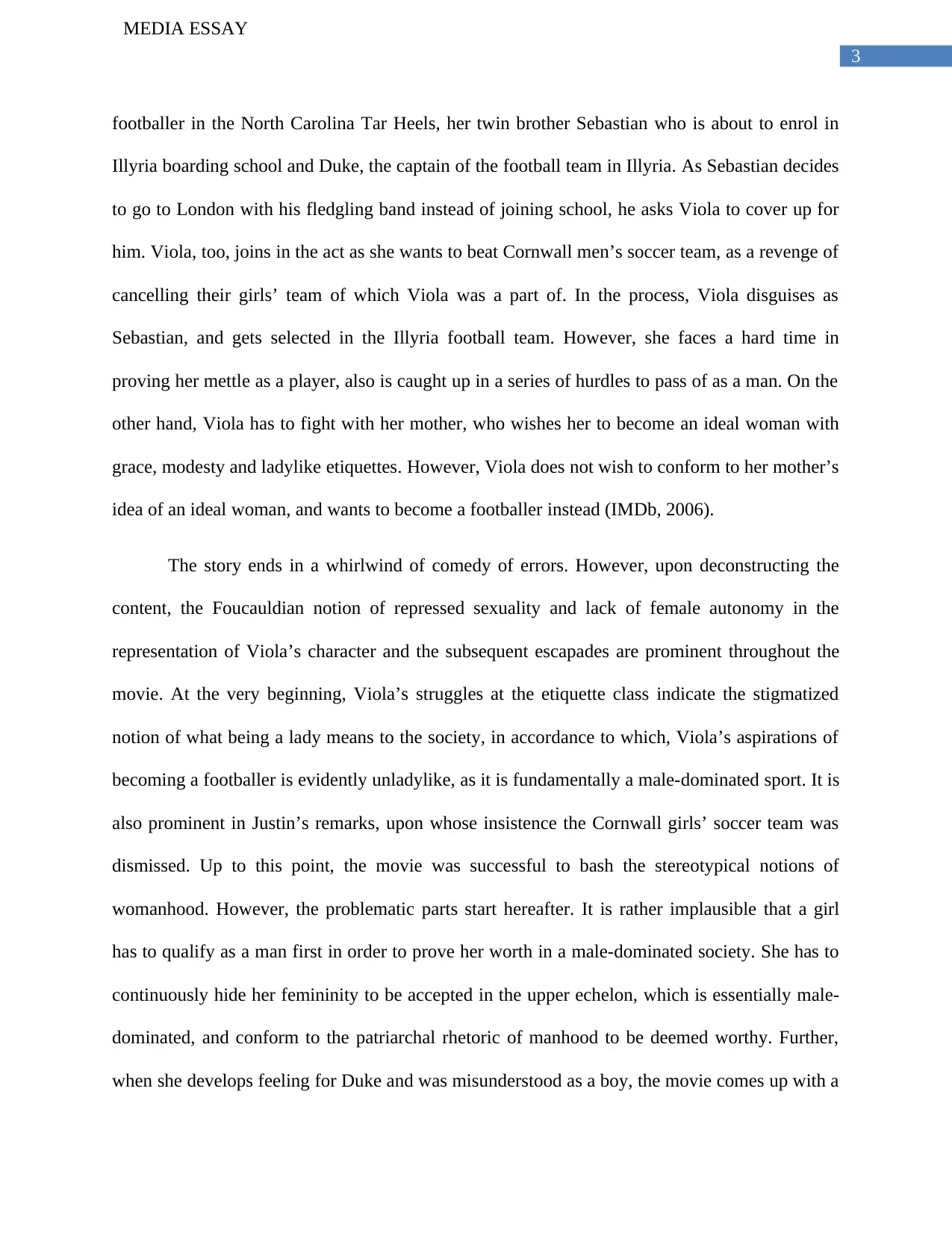
3
MEDIA ESSAY
footballer in the North Carolina Tar Heels, her twin brother Sebastian who is about to enrol in
Illyria boarding school and Duke, the captain of the football team in Illyria. As Sebastian decides
to go to London with his fledgling band instead of joining school, he asks Viola to cover up for
him. Viola, too, joins in the act as she wants to beat Cornwall men’s soccer team, as a revenge of
cancelling their girls’ team of which Viola was a part of. In the process, Viola disguises as
Sebastian, and gets selected in the Illyria football team. However, she faces a hard time in
proving her mettle as a player, also is caught up in a series of hurdles to pass of as a man. On the
other hand, Viola has to fight with her mother, who wishes her to become an ideal woman with
grace, modesty and ladylike etiquettes. However, Viola does not wish to conform to her mother’s
idea of an ideal woman, and wants to become a footballer instead (IMDb, 2006).
The story ends in a whirlwind of comedy of errors. However, upon deconstructing the
content, the Foucauldian notion of repressed sexuality and lack of female autonomy in the
representation of Viola’s character and the subsequent escapades are prominent throughout the
movie. At the very beginning, Viola’s struggles at the etiquette class indicate the stigmatized
notion of what being a lady means to the society, in accordance to which, Viola’s aspirations of
becoming a footballer is evidently unladylike, as it is fundamentally a male-dominated sport. It is
also prominent in Justin’s remarks, upon whose insistence the Cornwall girls’ soccer team was
dismissed. Up to this point, the movie was successful to bash the stereotypical notions of
womanhood. However, the problematic parts start hereafter. It is rather implausible that a girl
has to qualify as a man first in order to prove her worth in a male-dominated society. She has to
continuously hide her femininity to be accepted in the upper echelon, which is essentially male-
dominated, and conform to the patriarchal rhetoric of manhood to be deemed worthy. Further,
when she develops feeling for Duke and was misunderstood as a boy, the movie comes up with a
MEDIA ESSAY
footballer in the North Carolina Tar Heels, her twin brother Sebastian who is about to enrol in
Illyria boarding school and Duke, the captain of the football team in Illyria. As Sebastian decides
to go to London with his fledgling band instead of joining school, he asks Viola to cover up for
him. Viola, too, joins in the act as she wants to beat Cornwall men’s soccer team, as a revenge of
cancelling their girls’ team of which Viola was a part of. In the process, Viola disguises as
Sebastian, and gets selected in the Illyria football team. However, she faces a hard time in
proving her mettle as a player, also is caught up in a series of hurdles to pass of as a man. On the
other hand, Viola has to fight with her mother, who wishes her to become an ideal woman with
grace, modesty and ladylike etiquettes. However, Viola does not wish to conform to her mother’s
idea of an ideal woman, and wants to become a footballer instead (IMDb, 2006).
The story ends in a whirlwind of comedy of errors. However, upon deconstructing the
content, the Foucauldian notion of repressed sexuality and lack of female autonomy in the
representation of Viola’s character and the subsequent escapades are prominent throughout the
movie. At the very beginning, Viola’s struggles at the etiquette class indicate the stigmatized
notion of what being a lady means to the society, in accordance to which, Viola’s aspirations of
becoming a footballer is evidently unladylike, as it is fundamentally a male-dominated sport. It is
also prominent in Justin’s remarks, upon whose insistence the Cornwall girls’ soccer team was
dismissed. Up to this point, the movie was successful to bash the stereotypical notions of
womanhood. However, the problematic parts start hereafter. It is rather implausible that a girl
has to qualify as a man first in order to prove her worth in a male-dominated society. She has to
continuously hide her femininity to be accepted in the upper echelon, which is essentially male-
dominated, and conform to the patriarchal rhetoric of manhood to be deemed worthy. Further,
when she develops feeling for Duke and was misunderstood as a boy, the movie comes up with a
Paraphrase This Document
Need a fresh take? Get an instant paraphrase of this document with our AI Paraphraser
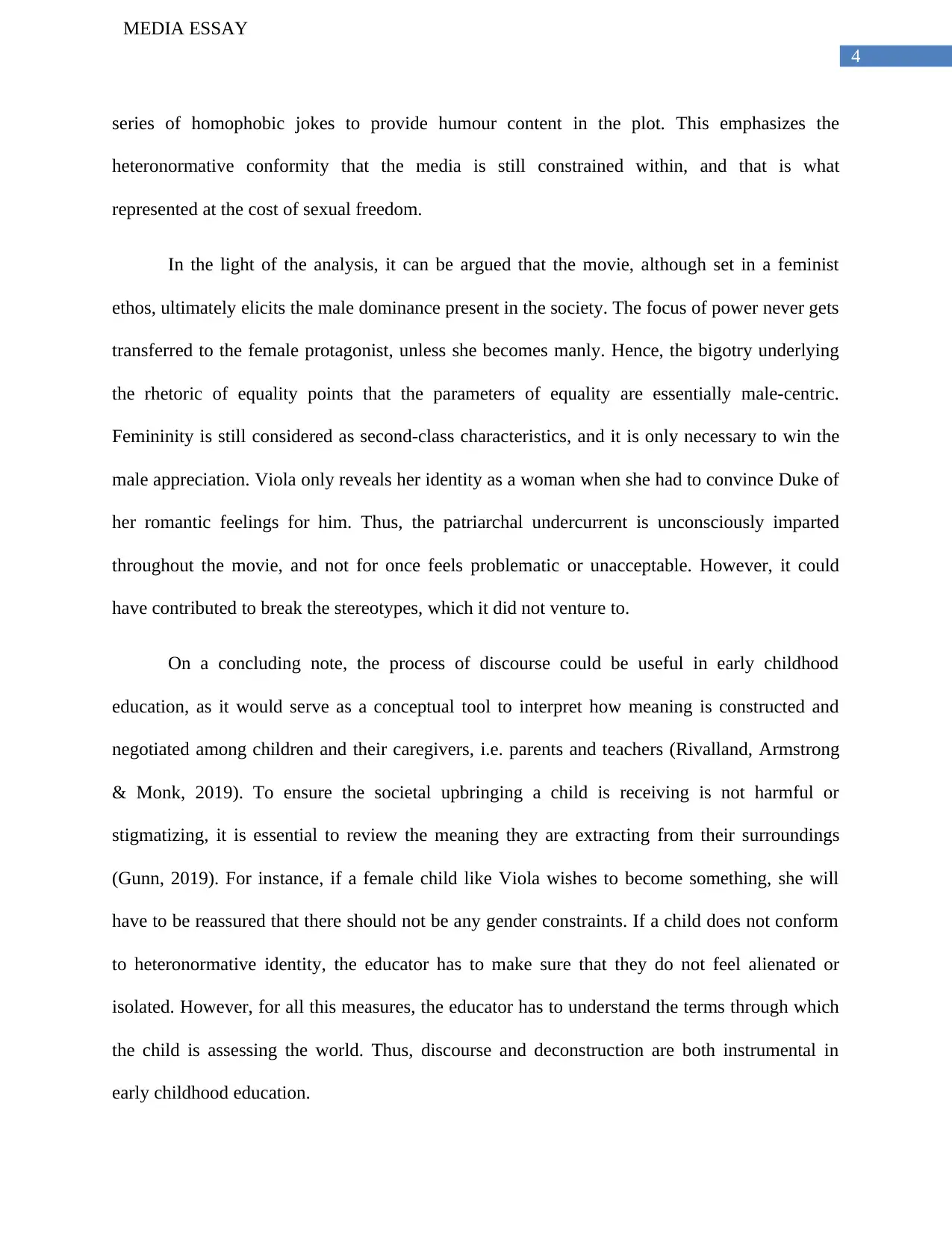
4
MEDIA ESSAY
series of homophobic jokes to provide humour content in the plot. This emphasizes the
heteronormative conformity that the media is still constrained within, and that is what
represented at the cost of sexual freedom.
In the light of the analysis, it can be argued that the movie, although set in a feminist
ethos, ultimately elicits the male dominance present in the society. The focus of power never gets
transferred to the female protagonist, unless she becomes manly. Hence, the bigotry underlying
the rhetoric of equality points that the parameters of equality are essentially male-centric.
Femininity is still considered as second-class characteristics, and it is only necessary to win the
male appreciation. Viola only reveals her identity as a woman when she had to convince Duke of
her romantic feelings for him. Thus, the patriarchal undercurrent is unconsciously imparted
throughout the movie, and not for once feels problematic or unacceptable. However, it could
have contributed to break the stereotypes, which it did not venture to.
On a concluding note, the process of discourse could be useful in early childhood
education, as it would serve as a conceptual tool to interpret how meaning is constructed and
negotiated among children and their caregivers, i.e. parents and teachers (Rivalland, Armstrong
& Monk, 2019). To ensure the societal upbringing a child is receiving is not harmful or
stigmatizing, it is essential to review the meaning they are extracting from their surroundings
(Gunn, 2019). For instance, if a female child like Viola wishes to become something, she will
have to be reassured that there should not be any gender constraints. If a child does not conform
to heteronormative identity, the educator has to make sure that they do not feel alienated or
isolated. However, for all this measures, the educator has to understand the terms through which
the child is assessing the world. Thus, discourse and deconstruction are both instrumental in
early childhood education.
MEDIA ESSAY
series of homophobic jokes to provide humour content in the plot. This emphasizes the
heteronormative conformity that the media is still constrained within, and that is what
represented at the cost of sexual freedom.
In the light of the analysis, it can be argued that the movie, although set in a feminist
ethos, ultimately elicits the male dominance present in the society. The focus of power never gets
transferred to the female protagonist, unless she becomes manly. Hence, the bigotry underlying
the rhetoric of equality points that the parameters of equality are essentially male-centric.
Femininity is still considered as second-class characteristics, and it is only necessary to win the
male appreciation. Viola only reveals her identity as a woman when she had to convince Duke of
her romantic feelings for him. Thus, the patriarchal undercurrent is unconsciously imparted
throughout the movie, and not for once feels problematic or unacceptable. However, it could
have contributed to break the stereotypes, which it did not venture to.
On a concluding note, the process of discourse could be useful in early childhood
education, as it would serve as a conceptual tool to interpret how meaning is constructed and
negotiated among children and their caregivers, i.e. parents and teachers (Rivalland, Armstrong
& Monk, 2019). To ensure the societal upbringing a child is receiving is not harmful or
stigmatizing, it is essential to review the meaning they are extracting from their surroundings
(Gunn, 2019). For instance, if a female child like Viola wishes to become something, she will
have to be reassured that there should not be any gender constraints. If a child does not conform
to heteronormative identity, the educator has to make sure that they do not feel alienated or
isolated. However, for all this measures, the educator has to understand the terms through which
the child is assessing the world. Thus, discourse and deconstruction are both instrumental in
early childhood education.
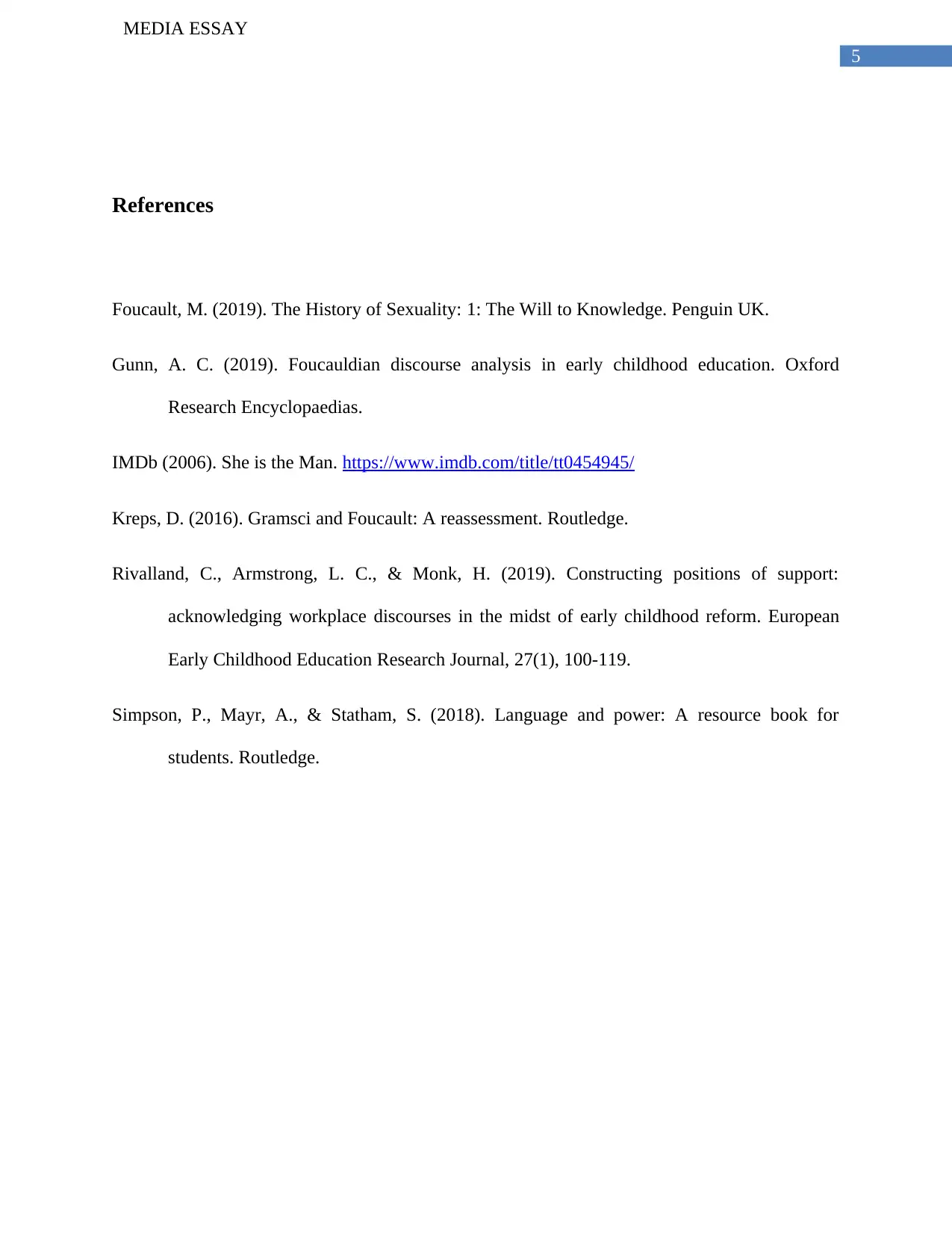
5
MEDIA ESSAY
References
Foucault, M. (2019). The History of Sexuality: 1: The Will to Knowledge. Penguin UK.
Gunn, A. C. (2019). Foucauldian discourse analysis in early childhood education. Oxford
Research Encyclopaedias.
IMDb (2006). She is the Man. https://www.imdb.com/title/tt0454945/
Kreps, D. (2016). Gramsci and Foucault: A reassessment. Routledge.
Rivalland, C., Armstrong, L. C., & Monk, H. (2019). Constructing positions of support:
acknowledging workplace discourses in the midst of early childhood reform. European
Early Childhood Education Research Journal, 27(1), 100-119.
Simpson, P., Mayr, A., & Statham, S. (2018). Language and power: A resource book for
students. Routledge.
MEDIA ESSAY
References
Foucault, M. (2019). The History of Sexuality: 1: The Will to Knowledge. Penguin UK.
Gunn, A. C. (2019). Foucauldian discourse analysis in early childhood education. Oxford
Research Encyclopaedias.
IMDb (2006). She is the Man. https://www.imdb.com/title/tt0454945/
Kreps, D. (2016). Gramsci and Foucault: A reassessment. Routledge.
Rivalland, C., Armstrong, L. C., & Monk, H. (2019). Constructing positions of support:
acknowledging workplace discourses in the midst of early childhood reform. European
Early Childhood Education Research Journal, 27(1), 100-119.
Simpson, P., Mayr, A., & Statham, S. (2018). Language and power: A resource book for
students. Routledge.
⊘ This is a preview!⊘
Do you want full access?
Subscribe today to unlock all pages.

Trusted by 1+ million students worldwide
1 out of 6
Related Documents
Your All-in-One AI-Powered Toolkit for Academic Success.
+13062052269
info@desklib.com
Available 24*7 on WhatsApp / Email
![[object Object]](/_next/static/media/star-bottom.7253800d.svg)
Unlock your academic potential
Copyright © 2020–2025 A2Z Services. All Rights Reserved. Developed and managed by ZUCOL.





